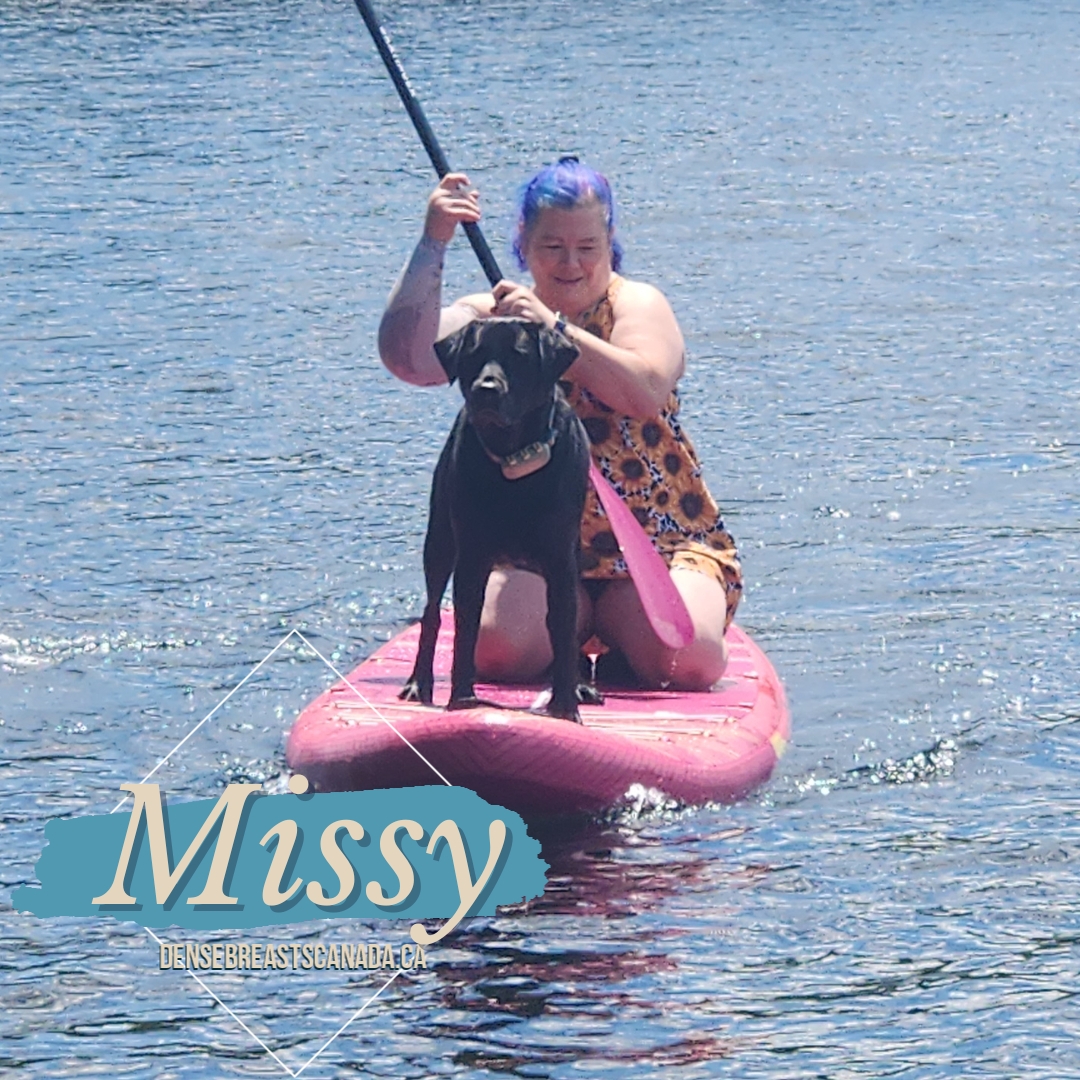Missy

About me: I grew up in Burlington, Ontario, one of 4 girls. Our family had no history of breast cancer -until me. I am an artist by training. For the last number of years, I’ve created dance wear for children participating in competitive dance.
My breast cancer story: In 2018, shortly after moving to Ottawa, I was showering when felt a lump near the bottom of my right breast. I didn’t have a family doctor and went to walk-in clinic. The doctor didn’t believe the lump was of any concern. I was told that I was too young to have breast cancer. I was 42. I insisted on being examined and when he felt the lump, I saw concern on his face. However, he sent in a requisition in for a regular mammogram, without indicating there was a lump. When I didn’t hear back about an appointment, I called the clinic and was informed my appointment would be in March. Given it was November, that was 4 months wait. I explained that I had a large lump and was able to get an appointment a week and a half later.
After the mammogram, I was taken for an ultrasound. The radiologist was called in and he told me the lump looked like cancer and that it had possibly spread to a lymph node.
A week and a half later, the tumour and a lymph node in my arm pit were biopsied and then another week later I got a call to come see the surgeon. A pre-operative MRI found that I actually had another tumour that wasn’t seen on the mammogram or ultrasound. I didn’t know at the time that I had Category C density which can make tumours hard to see.
Since the tumours were large, 4 cm and 3.5 cm, I wanted a double mastectomy, but that’s not what I was given. My husband came with me to my first surgical appointment. After I said I wanted a double mastectomy, the female surgeon separated me from my husband. She told me she wanted me to do a lumpectomy as she felt my husband would want me to keep my breasts. The person I am today would not have given in. I had a lumpectomy in January with 14 nodes from my underarm removed as well. Cancer was found in 8 of the nodes.
Following surgery, I developed swelling and when I returned to the hospital, I was told it was normal. The next day I woke up covered in fluid with the stitches separating. It took 3 visits a week to the nursing care centre for 14 weeks and a wound vac until the wound cleared.
It was not until March that I had my first visit with the oncologist and he ordered a CT scan. He then asked for a reread of my MRI. That is when I learned that another tumour existed-near the collarbone- but had been missed. I was now considered stage 3b. If that tumour had been seen earlier, I would have started chemo first. I was now 3 months late starting chemotherapy and we couldn’t wait for my wound to close entirely. I completed chemo and then radiation. I was given Tamoxifen, but couldn’t tolerate it. I developed lymphedema. Instead of staying on drugs to suppress my estrogen, I decided to have a hysterectomy.
My breast became misshapen from the lumpectomies and once again I brought up a double mastectomy. When a male surgeon highly discouraged it and told me I needed to see a psychologist first, I responded that I was going to find someone else, but he relented. I wanted to go flat but he did not like that idea and said most women will change their mind once they see themselves. I found a great deal of sexism in my breast cancer experience. I had to continuously advocate for myself every step of the way.
What I want you to know: Now almost six years later, looking back, no one ever told me about the importance of mammograms. I continue to experience significant side effects from my late-stage diagnosis. Most people don’t understand that breast cancer is not over once chemo is done; there are lifelong impacts. Early detection and early treatment are critical. If my tumours had been found 6 months earlier, I believe I could have been spared much of the suffering. If I had known about my dense breasts and the implications, I never would have agreed to a lumpectomy. Now I understand about the possibility of additional tumours being hidden. That knowledge would have made me a better advocate for myself for mastectomy. It is so important to be informed so that you can advocate for yourself. If you don’t, no one else will do it for you.
DBC note: Missy, our gratitude to you for sharing your experience so openly and courageously. You have shown us how patriarchal the system can still be and how important it is to be informed so one can advocate for oneself. The lessons you have imparted will serve us all well. Thank you.
